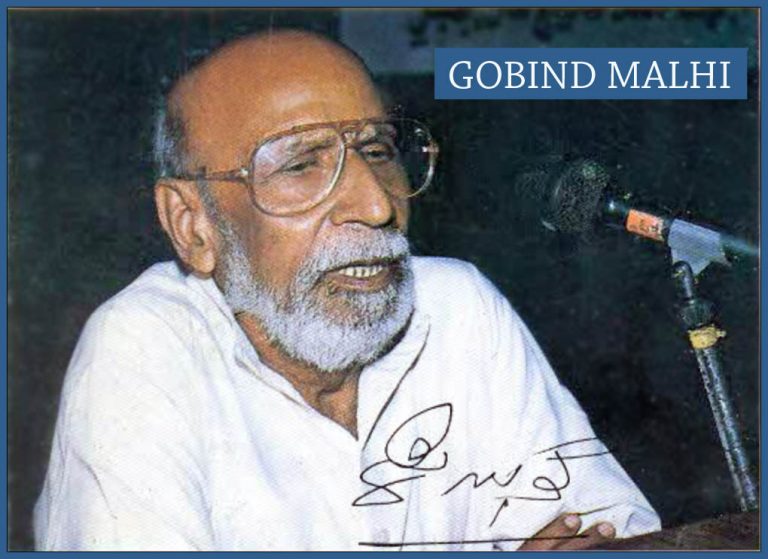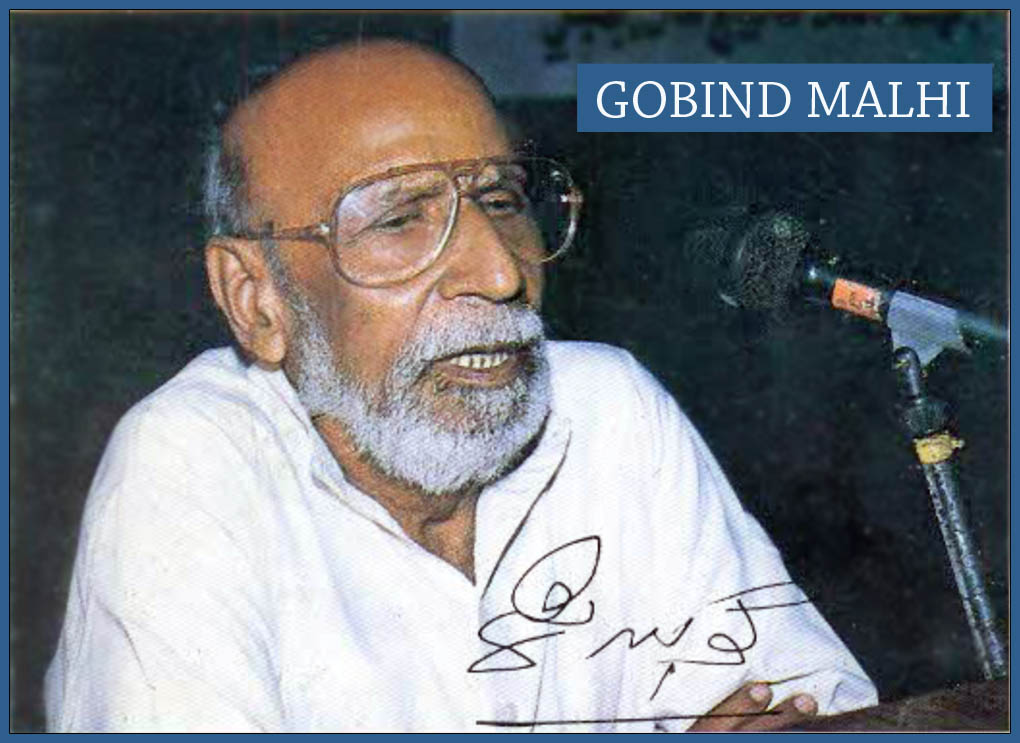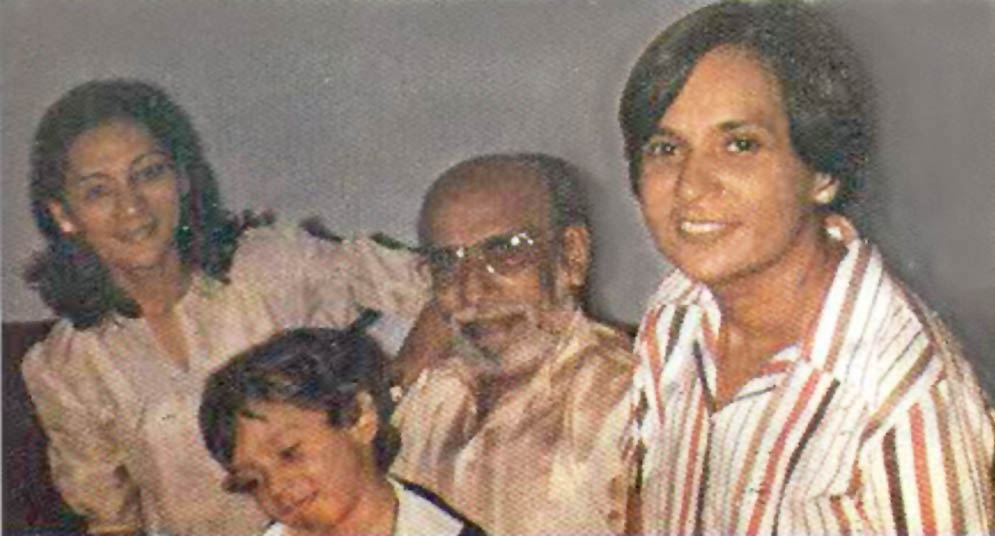
 Remembering Gobind Malhi, the High Priest of Sindhi Literature and Roving Ambassador of Sindhi Language and Culture, who passed away on February 10, 2001
Remembering Gobind Malhi, the High Priest of Sindhi Literature and Roving Ambassador of Sindhi Language and Culture, who passed away on February 10, 2001
Gobind Malhi who was considered a high priest of progressive literature in Sindhi, and was trend setter in depicting social realty to the core in his works, and portrayed the emotions and aspirations, the hopes and fears, the inner heavens and hells of the lower middle class society in detail, had passed away on February 10, 2001.
His works reveal the gloomy side of life. Devoted to full time writing, he was consistent fiction writer, one act playwright and essayist. Particularly in his novels and short stories, his approach was characterized by humanist insight, absence of dramatic flourishes and realistic portrayal of the social scene. He knew the craft of novel, short stories as well as one-act play, and each piece of his works is an aid to a progressive understanding of the complex psychology of human being.
The novels of Malhi bear the imprints of social and political conflicts. He painted the society he had known as close quarters. Very much alive to the currents and cross currents of time and space, he always had different tale to tell and that too in a different mode. In almost all his writings, Malhi generally dealt with social problems that confronted the people belonging to the lower middle-class.
Gobind Malhi was born in 1921 at Tharushah, a small village in central part of Sindh, known as Sahiti Pargana in a family of land-lords. He had his primary as well as high school education at his village and shifted to Karachi for higher education. It is interesting to note that after doing his LLB he never practiced law even for a day and threw himself in the fray of the politics of the day. He took active part in 1942 Movement and was imprisoned for three months. At that time he came into contact with the Marxist student leader Sobho Gianchandani, who initiated him into Marxist philosophy. Later, he joined the Communist Party of India and remained Secretary of its Karachi Chapter for some time. Being attracted by Marxist progressive literature, he became a pioneer of progressive movement in Sindh.
Malhi’s youth witnessed the patriotic upsurge of Gandhian era and terrors that traumatized the Hindu population of Sindh at the time of the partition of India. He migrated to Mumbai where a literary circle “Nao Sahit Mandal” was setup and he became its Secretary. By virtue of this, he was again in the forefront of Sindhi literary scene, carrying two missions at the same time viz. his creative activity and promotion of the cause of survival of Sindhi Language in India. He had been General Secretary and then President of Akhil Bharat Sindhi Boli ain Sahit Sabha for many years.
Malhi established ‘Kalakar Mandar’ (a cultural troupe) to encourage Sindhi culture in 1951, and the group staged a large number of plays. Bhagwanti Navani, Madan Jumani, Ishwar Navani, Satram Rohra and other famous artists were part of famous Kalakars in Mandal.
Gobind Malhi had also written, directed and staged many one-act plays. Some of them worth mentioning are “Kafan”, “Gustakhi Maaf”, “Mahiman”, “Juhu Je Kinare”, “Sasui Punhoo”, “Maan Moti Endus”. He had sharp eye for talent in budding artists. He could bring out that talent on stage by grooming these artists. Bhagwanti Navani and Pushpa Malhi are such examples who excelled in their art form and became famous. Gobind Malhi will always be remembered for grooming and introducing Bhagvanti Navani and Pushpa Malhi to Sindhi Stage.
He was roving ambassador of Sindhi culture and with the culture troupe he visited all corners of India and the places of Sindhi concentration abroad to give Sindhi folk music programs in order to keep Sindhi culture alive. He was also associated with the Indian Peoples’ Theatre Association and occupied an important position in the setup, working with eminent theatre personalities like Ritwick Ghatak, R M Singh, A K Hangal, Sanjeev Kumar and others.
Malhi wrote in the language the common people speak, abounding in native flavor. His contribution to Sindhi short story and one act play is as great as to the novel genre. He wrote two dozen novels, thirty-two one act plays compiled in three volumes, forty short stories compiled in three volumes, an autobiography in five volumes and host of literary articles. He was also editor of a few literary journals including ‘Murk’, a Sindhi literary magazine.
Malhi’s novel ‘Pyara Ji Pyas’ was picked up for Sahitya Academy Award for the year 1973. The novel depicts the spiritual odyssey of a woman to a tormenting conflict between the cosmic principles and the mundane. The dehumanizing experiences she had in the hands of the males of different strata of society who came into her life, led her to a state of disillusionment, the thirst of true love ever remaining unquenched. The whole story is narrated from the perspective of the woman, the central character in a manner close to the stream of consciousness mode.

Although Malhi is labelled a progressive writer and is known as forerunner of the whole progressive trend in Sindhi fiction, in his short stories he gives greater importance to human relations than the slogans dictated by ideology. Beyond its mix of captivating descriptive elements and brisk pacing, he has treated the material in his short stories with admirable clarity and human interest, and has been panoramic in his treatment of the theme.
“Adab ain Adib” is Malhi’s autobiographical work running into five volumes in which he recounts his life’s story. Besides being a narrative of his life, development and work, it also recreates the entire background-social, cultural, literary and political of a long period of more than five decades. While being an account of his life, his childhood and education, his career as crusader of Sindhi culture, the book details how a sensitive and righteous temperament evolved and expressed itself in a variety of works in many genres of literature. In the first volume he dwells on his childhood. In fact, every writer recalls the power of childhood when the tumultuous variety of the real world is charged with miracles, when inanimate object speak out and dreams are bigger than the night itself. But remembering and recreating are different matters and only a handful of writers can retrieve the wonders and textures of childhood.
With every successive work, Malhi elevated his reputation as a writer of great charm, serious intent and innovative talent.
Malhi received many awards for his exceptional work.
Dada Gobind Malhi produced and directed the Sindhi Movie “Sindhu-A Je Kinare” in year December 1968. Many songs of this movie are still very famous. Famous Sindhi artists who acted in this movie were Bhagwanti Navani, Madan Jumani, Amar Chandnani, S.P. Menghani, Ramesh Jajani, Ramesh Raj and J. Ishu. Songs were sung by Master Chander, Ram Panjwani, Satram Rohra and Chandru Aatma. Music was given by C. Arjun. Songs were written by Gordhan Bharti.
_____________________